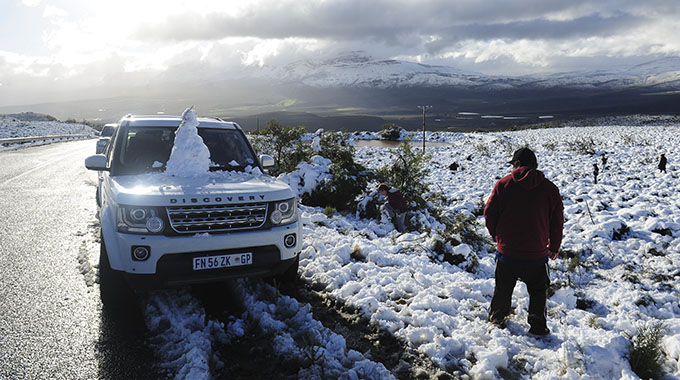Snow, rain bring much-needed relief to drought-hit Cape

CAPE TOWN. – Severe rainstorms lashed Cape Town and other parts of the drought-stricken Western Cape overnight, leading to severe flooding in places.
Snowfall on the high-lying areas of the Western Cape was also expected to bring much-needed recharge relief to the province’s dams.
Significant rainfall also had a positive effect on the dam levels of the province, the national department of water and sanitation said.
Severe rainstorms lashed Cape Town and other parts of the drought-stricken Western Cape overnight, leading to severe flooding in places.
“Significat rainfall over the weekend and early this morning (Mondaymorning) has brought needed relief to the Western Cape dams. According to the latest dam levels assessments of 02 July 2018, the combined average dam levels for the Western Cape Water Supply System (WCWSS) are at 48.33 percent as compared to 42.33 percent last week.”
Theewaterskloof Dam, the largest dam in the system had risen to 34.15 percent compared to 19.24 percent at the same time last year, department spokesperson Sputnik Ratau said.
“Misverstand dam on the West Coast is at 157.38 percent; Voëlvlei has also improved to 44.66 percent from 36.27 percent the previous week. The Clanwilliam dam on the West Coast is also showing an improvement from 57.46 percent last week to 67.69 percent this week. The total storage for Western Cape dams is 41.50 percent.
“The South African Weather Services reports snow over of the mountain peaks in the province, with significant rainfall recorded in the province over the past 24 hours. Ceres recorded about 124 mm of rainfall and Grabouw recorded 65 mm. More rain is expected throughout the day in most parts of the province,” he said.
The department also warned people to take precautionary measures as some areas experience localised flooding.
“We welcome rain in the province as it is good for the water security, yet we also encourage people to take extra caution in this time. Levels of water in the rivers rise and this means people must be careful when crossing these rivers”, said Ratau.
Following declining water levels in the dams, the department intensified some measures by decreasing the abstraction of water from the WCWSS by 45 percet for domestic and industries and 60 percent for the agricultural sector.
“Agricultural use restrictions were raised from 50 percent to 60 percent. These remain in place until a review of the status is done at the hydrological cycle upcoming,” the department said.
“The Department is continually monitoring the levels of all dams in the province. The Western Cape receives its water primarily in winter and with this significant rain, there is hope that the dams will recharge faster,” it said. – Cape Argus







Comments